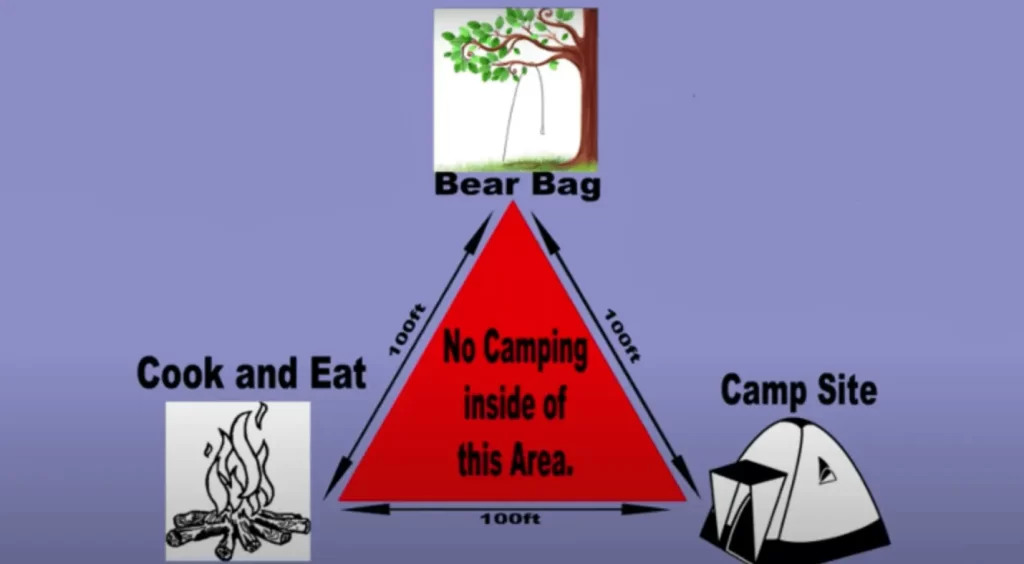How to keep bears away when camping
How to keep bears away when camping in bear country is the first question that usually comes to mind. Bears visit camping sites for a variety of reasons, such as being attracted by the smell of food or garbage or looking for an easy source of food.
Additionally, they may wander into camping tents in search of shelter or protection from predators.

A bear’s sense of smell is 2100 times stronger than a human’s. Bears have an unusually sensitive sense of smell that is about seven times stronger than the blood of prey.
They can detect scents from up to 18 miles away and can even distinguish between different smells.
How Dangers Bears are
The probability of a bear killing a human is actually quite low. The most common threats associated with black bears are non-lethal contact with humans, such as bites and scratches, but this does not mean you will not encounter a bear if you are camping inside their active zone.
Then it became a serious question of how to keep bears away when camping. In fact, bears can become dangerous if they feel threatened or provoked by your actions.
Bears are usually more aggressive during mating season, which is usually from late May to early July, as well as in the late summer when they are trying to build up large numbers for the winter.
So you must not only be prepared but also know the bear’s state of mind so that you can get out of the situation safely without harming each other. To be safe, it’s best to avoid them.
Which bear is more dangerous? It is difficult to say which bear is more dangerous because their behavior can vary depending on the specific situation.
In general, black bears are less aggressive, while brown bears can become hostile if they feel threatened or provoked. It is best to stay away from both types of bears and give them plenty of space if encountered in the wild.

Safety tips: how to keep bears away when camping
These are the following tips that will not only keep you safe but also minimize your encounter with them:
Conduct research before choosing a campsite
To answer the question of how to keep bears away when camping, This is the first step that will ensure your safety while camping. Before choosing any campsite, do proper research on it, the most important of which are local laws for the safety of humans and other animals.
What you can and can’t carry, for example, bear repellant spray, is prohibited in Yosemite National Park. If you are moving into a bear-active zone, ensure the availability of publicly available facilities such as bear containers and bear-proof trash containers.
Additionally, When choosing a campsite, it is important to find a site away from any potentially dangerous areas such as cliffs, lakes, and rivers. Make sure the terrain is level and free of large rocks or roots that could cause tripping hazards.
Also, consider the sunlight, wind, and other weather conditions in the area. Finally, confirm that firewood, water, and bathrooms are readily available at the campsite for your convenience.
Common items that can attract bears
Common items that can attract bears include food, garbage, cosmetics, lotions, scented soaps, toothpaste, and even pesticides.
These items have a strong smell that can be detected by a bear’s keen sense of smell. To avoid attracting bears, it is important to store all food, garbage, and other odorous items in bear-proof containers or away from the campsite.
How to keep bears away when camping, Follow the triangle Rule
Your camp should consist of three places, the first being your camping tent, where you will establish your tent and camping chairs to spend most of your time.
The second location should be your camping kitchen where you will cook your food while camping, and the third location should be your food storage point, where you will store your food. These three spots should be about 100 feet apart in a triangle shape.
The logic behind this is that keeping food away from the tent will make your campsite less attractive to bears. Likewise, your camping kitchen should be in a different position than yours. This triangle will answer your question about how to keep bears away when camping

Store food properly
To prevent bears from being attracted to your camping site, it is important to keep food properly sealed. Bears have an exceptional sense of smell and can detect the scent of food from a distance. That is why it is recommended that you use beer-proof containers, as they are made of steel or plastic and are specially designed to keep your food safe. This will help prevent conflicts.

Clean campsite
The best answer to how to keep bears away when camping? By cleaning up your campsite. If you spread any garbage or food scraps, it will attract bears from far away to your campsite in search of food. It is always recommended to clean your campsite before setting up tents and to maintain it while camping. To protect bears and humans, never throw garbage in an open bin, and always try to search for a bear-proof container.
Don’t store food items inside the vehicle
It is generally not recommended that you store food or other bear-attracting items inside your vehicle, as vehicles generally do not stop the smell of these items. If a bear is in the area, it can completely destroy your car for a small piece of food that you forgot in it. To protect your vehicle, do not attract any bears to it.

How to keep bears away when camping in short
These are the few steps that answer your question about how to keep bears away when camping, concisely.
- Make plenty of noise while hiking to alert bears of your presence.
- Stay in groups and keep children close by at all times.
- Be aware of your surroundings, including any potential trails or animal tracks that may indicate a bear’s presence. 4. Avoid carrying foods with strong odors that may attract bears.
- Always keep a safe distance from any bears you encounter.
What Not to Do When You Encounter a Bear
If you’re thinking about feeding a bear, no, feeding a bear is never recommended. Bears that associate humans with food can be aggressive and dangerous. Feeding a bear not only puts you at risk, but it can also disrupt their natural eating habits and damage their relationship with the local ecosystem.
The second thought that might come to your mind is that I should take a photo. Taking photos of bears is not recommended due to the potential for danger. A bear can be threatened or provoked by a camera, which can lead to negative or dangerous encounters. For your safety, it’s best to watch bears from a distance and never approach them.
What to Do When You Encounter a Bear
If you encounter a bear, it’s best to stay calm and back away slowly without turning your back. Avoid direct eye contact with the bear, stand your ground, and speak to it in a reassuring voice. If the bear becomes aggressive, make yourself look as big as possible by standing up and raising your arms, and throw anything near it before backing away slowly.
If the bear continues to approach you, do not run. Instead, back away slowly, making noise, and if a fight breaks out, curl your head and neck into a ball to protect yourself. Additionally, use bear spray if available and call for help if possible. If a bear attacks you, respond as aggressively as possible.
After the encounter, it is important to immediately report the incident to park rangers, wildlife authorities, or other local authorities. Additionally, make sure to check yourself for any wounds and seek medical help if necessary. Finally, it is essential to understand how to recognize bear behavior and know what to do in order to avoid a dangerous situation. Hopefully, your question is how to keep bears away when camping will be cleared






